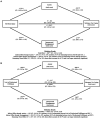Protective and risk factors associated with substance use coping among healthcare workers during the COVID-19 pandemic
- PMID: 38173849
- PMCID: PMC10761529
- DOI: 10.3389/fpsyg.2023.1228517
Protective and risk factors associated with substance use coping among healthcare workers during the COVID-19 pandemic
Abstract
Background: Healthcare workers (HCWs) experienced high levels of stress and mental health consequences associated with the COVID-19 pandemic, which may have contributed to unhealthy coping behaviors, such as substance use coping (SUC). This study aimed to understand the extent of and predictors of SUC.
Methods: The sample consisted of 263 HCWs in North Central Florida. Univariable and multivariable logistic regression analyses investigated whether moral injury and other work risk factors, protective factors, and clinically relevant symptoms (i.e., work exhaustion, interpersonal disengagement, depression, anxiety, and/or PTSD) were associated with likelihood of SUC.
Results: Clinically relevant levels of interpersonal disengagement and anxiety increased the likelihood of SUC. Mediational analyses found that interpersonal disengagement and anxiety explained 54.3% of the relationship between Self Moral Injury and SUC and explained 80.4% of the relationship between professional fulfillment and SUC.
Conclusion: Healthcare supervisors should be aware that providers who are experiencing moral injury and less professional fulfillment may be experiencing significant interpersonal disengagement and anxiety, which could lead to SUC. Future studies should examine the effects of implementing targeted prevention and treatment interventions, along with longitudinal outcomes related to SUC behaviors.
Keywords: COVID-19; anxiety; burnout; healthcare workers; interpersonal disengagement; moral injury; professional fulfillment substance use coping; substance use coping.
Copyright © 2023 Bryant, Sorna, Dana, Leon, Guastello, Sambuco, Huxhold, Allen, Cuffe, Mathews and Dale.
Conflict of interest statement
The authors declare that the research was conducted in the absence of any commercial or financial relationships that could be construed as a potential conflict of interest.
Figures
Similar articles
-
Resilient, but for how long? The relationships between temperament, burnout, and mental health in healthcare workers during the Covid-19 pandemic.Front Psychiatry. 2023 Jun 29;14:1163579. doi: 10.3389/fpsyt.2023.1163579. eCollection 2023. Front Psychiatry. 2023. PMID: 37484670 Free PMC article.
-
Morally Distressing Experiences, Moral Injury, and Burnout in Florida Healthcare Providers during the COVID-19 Pandemic.Int J Environ Res Public Health. 2021 Nov 24;18(23):12319. doi: 10.3390/ijerph182312319. Int J Environ Res Public Health. 2021. PMID: 34886045 Free PMC article.
-
Burnout, mental health, physical symptoms, and coping behaviors in healthcare workers in Belize amidst COVID-19 pandemic: A nationwide cross-sectional study.Int J Soc Psychiatry. 2023 Jun;69(4):1033-1042. doi: 10.1177/00207640231152209. Epub 2023 Feb 6. Int J Soc Psychiatry. 2023. PMID: 36748178 Free PMC article.
-
Burnout status of healthcare workers in the world during the peak period of the COVID-19 pandemic.Front Psychol. 2022 Sep 21;13:952783. doi: 10.3389/fpsyg.2022.952783. eCollection 2022. Front Psychol. 2022. PMID: 36211838 Free PMC article.
-
The psychological impact, risk factors and coping strategies to COVID-19 pandemic on healthcare workers in the sub-Saharan Africa: a narrative review of existing literature.BMC Psychol. 2022 Dec 1;10(1):284. doi: 10.1186/s40359-022-00998-z. BMC Psychol. 2022. PMID: 36457038 Free PMC article. Review.
Cited by
-
Effects of compassion satisfaction, burnout, and secondary traumatic stress on current drug use among healthcare workers: Differences by occupational level.Addict Behav Rep. 2025 Jan 7;21:100584. doi: 10.1016/j.abrep.2025.100584. eCollection 2025 Jun. Addict Behav Rep. 2025. PMID: 39881784 Free PMC article.
-
Substance use among healthcare professionals: A cross-sectional study in Kenya.PLOS Glob Public Health. 2025 Mar 24;5(3):e0003863. doi: 10.1371/journal.pgph.0003863. eCollection 2025. PLOS Glob Public Health. 2025. PMID: 40127086 Free PMC article.
References
Grants and funding
LinkOut - more resources
Full Text Sources


